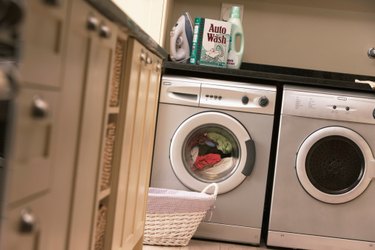
In the past, hot water was the standard for cleaning white clothes in a washing machine. However, budget and environmentally conscious consumers are now opting to wash whites in either warm or cold water. According to Michael Bluejay in his article, "How Much Does it Cost to Run a Washing Machine?" the yearly electricity cost of washing clothes in hot water and rinsing them in warm water is $265, compared to $206 for washing and rinsing clothes in warm water. This yearly total drops to a jaw-dropping $16 for washing and rinsing clothes in cold water. However, cold water may not be as effective as warm water for white laundry.
Warm Water
Video of the Day
The 25 Green Tips website states that warm water is preferred for whites since it produces the increase in temperature necessary to thoroughly clean white clothes. Elizabeth Mayhew in "Solutions to a Laundry List of Washing Dilemmas," suggests using either warm or hot water for whites if you have an older model top-loading washing machine because the detergent cannot sufficiently clean clothes in temperatures less than 65 degrees.
Video of the Day
Cold Water
BC Hydro promotes cold water usage, asserting it will clean white clothes just as well as warm or hot water, and for hard-to-remove stains, it recommends using a pre-laundry spot removal. It only advocates the usage of warm water for extremely stubborn dirt or oil stains. Mayhew agrees that, if you have a newer, front loading machine, even on the cold water setting, these washing machines mix hot and cold water together to a temperature of 70 degrees, which is sufficient for activating detergents.
Hot Water
According to Housecleaning Central, you should actually wash white items like towels and underwear in hot water (although this usually causes shrinkage), and you should wash light-colored items in warm water based on the theory that warm water does not reach a temperature sufficient to effectively clean white clothes, and the site makes no distinction between front- and top-load washers.
Other Considerations
Many vendors now manufacture liquid laundry detergents designed for use in cold-water, which eliminates the need to use warm or hot water. Also the washing machine's tumbling motion or agitation process contributes as much -- if not more -- to the cleaning process as the water temperature. Depending on the style of your washing machine and the type of laundry detergent you select, using warm or cold water may just be a matter of personal preference.
- Michael Bluejay.com; How Much Does it Cost to Run a Washing Machine?; Michael Bluejay; May, 2011
- 25 Green Tips.com: Wash Clothes in Cold Water
- MSNBC Today; Solutions to a Laundry List of Washing Dilemmas; Elizabeth Mayhew; March 4, 2008
- BC Hydro; Get Cool About Washing Laundry; March 31, 2011
- House Cleaning Central: Mrs. Clean: How to Wash Laundry